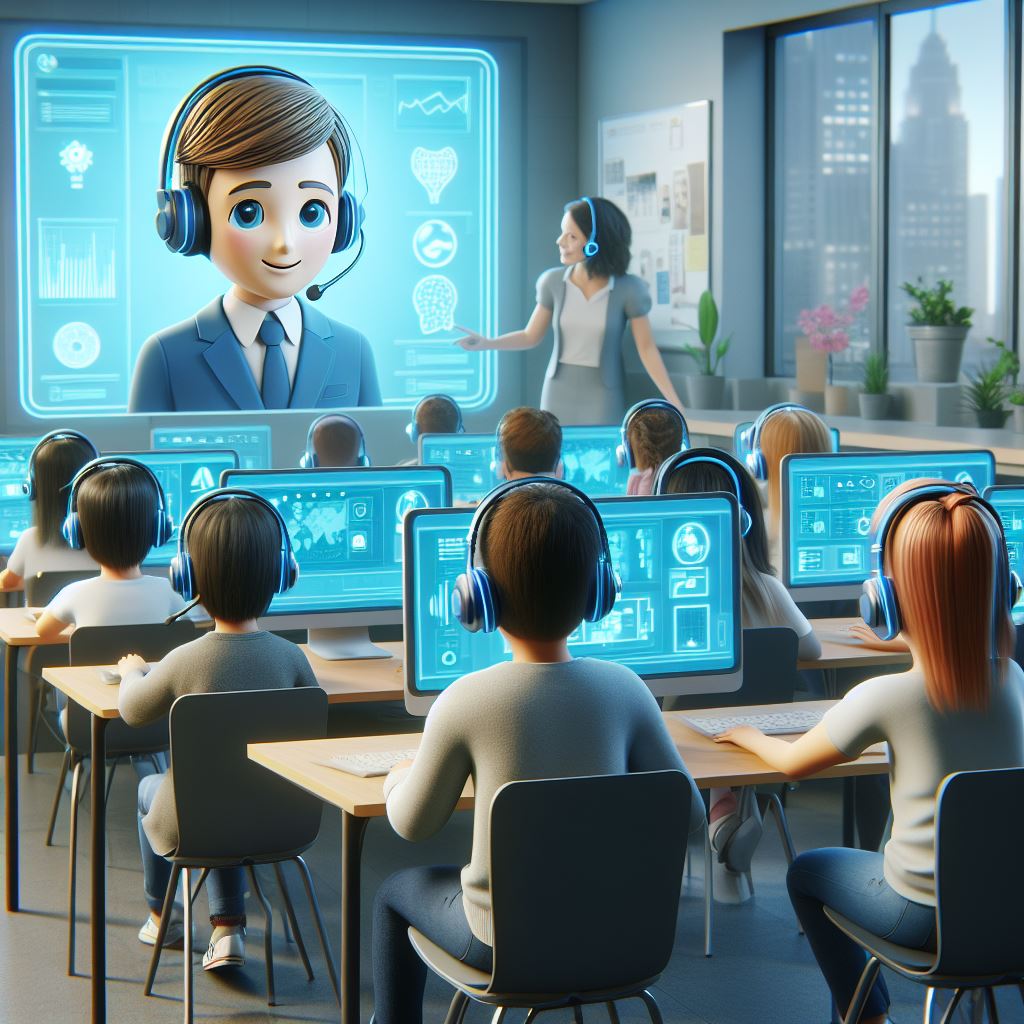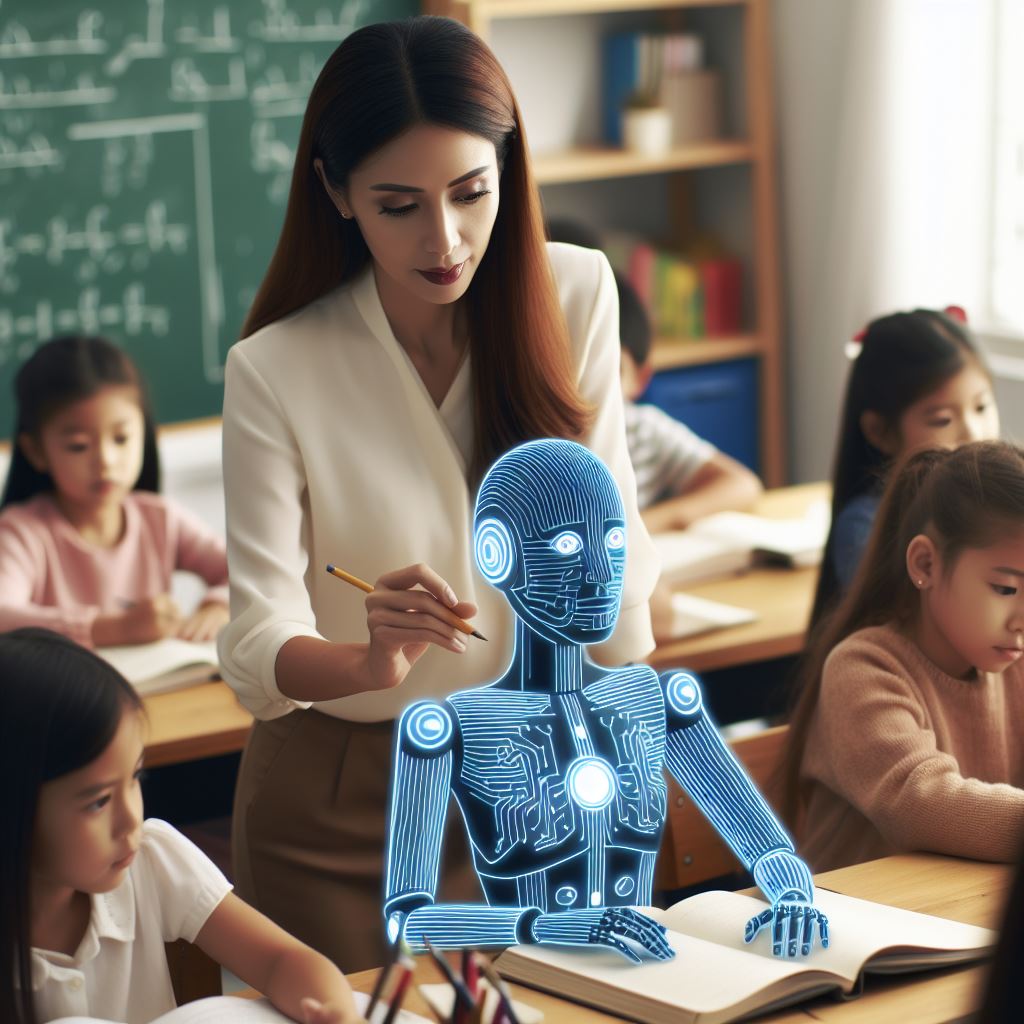Introduction
The integration of AI-Powered Adaptive Education marks a transformative paradigm shift, revolutionizing the traditional learning landscape. AI’s adaptive capabilities have propelled the evolution of personalized learning, fostering tailored educational experiences for every learner. Through sophisticated algorithms and data analytics, AI dynamically adjusts content delivery, pacing, and curriculum to suit individual learning styles and abilities. Transitioning from one-size-fits-all approaches to adaptive learning models, AI ensures a more engaging and effective educational journey. Moreover, AI-powered tools facilitate real-time assessment, enabling educators to track student progress and offer timely interventions. This revolution in personalized learning, driven by AI’s adaptability, promises not just individualized education but also the cultivation of critical thinking, problem-solving skills, and a deeper understanding of diverse subjects. As AI continues to refine its adaptive capabilities, it shapes a future where education is tailored to the unique needs and potentials of each learner.
The Coming Era of AI in Education
The dawn of AI in education heralds a transformative era, promising a seismic shift in how we approach learning and teaching. As Artificial Intelligence becomes increasingly integrated into educational frameworks, its potential to revolutionize traditional methods is palpable. AI’s adaptive capabilities are reshaping the educational landscape, offering tailored learning experiences that cater to individual student needs and learning styles. This coming era signifies a departure from standardized education, embracing a more personalized and adaptive approach that optimizes learning outcomes.
Moreover, AI’s role transcends mere personalization, extending to sophisticated data analytics and predictive algorithms that refine curriculum design and assessment methodologies. It not only assists educators in creating tailored content but also provides real-time feedback, enabling swift adjustments to teaching methodologies to suit students’ evolving requirements. This technological leap forward in education not only fosters greater engagement but also empowers educators by augmenting their teaching strategies.
The integration of AI in education foretells an era where learning becomes more inclusive, efficient, and dynamic. It’s a beacon illuminating the path toward a future where education transcends boundaries, empowers learners of diverse backgrounds, and ensures that each student’s educational journey is optimized for their individual growth and success.
Adaptive Learning Models
I. Introduction to Adaptive Learning Models: Adaptive learning models, driven by AI, represent a groundbreaking shift in education. These models harness AI algorithms to tailor educational content, pacing, and strategies based on individual student needs. This personalized approach marks a departure from traditional one-size-fits-all teaching methods.
II. The Functionality of AI-Driven Adaptivity: AI-powered adaptivity operates through continuous data analysis, evaluating student performance and learning patterns. This data-driven approach allows for the dynamic adjustment of content difficulty and learning pathways, ensuring an optimized learning experience for each student.
III. Benefits of Adaptive Learning: The benefits of adaptive learning models are manifold. They facilitate personalized learning paths, accommodating diverse learning styles and abilities. Moreover, these models enhance engagement and motivation by providing relevant and challenging content tailored to each learner’s proficiency level.
IV. Impact on Student Outcomes: The impact of AI-driven adaptivity on student outcomes is profound. Students experience increased retention rates and deeper understanding of subjects as content adapts to their learning pace and preferences. Additionally, adaptive learning models often lead to improved academic performance and greater self-efficacy.
V. Future Implications and Advancements: Looking ahead, the future implications of AI-based adaptive learning are vast. Further advancements in AI technology will likely refine these models, offering even more personalized and effective educational experiences. Embracing these advancements promises a future where education is truly tailored to the unique needs and potentials of every learner.
Benefits of Personalization in Education
Personalization in education offers a multitude of benefits, revolutionizing traditional teaching methodologies. By tailoring learning experiences to individual student needs, it cultivates a more engaging and effective educational environment. Transitioning from conventional standardized approaches, personalized education ensures a deeper understanding of subjects by catering to diverse learning styles and abilities. Moreover, it fosters greater student engagement, motivation, and active participation in the learning process. Additionally, personalized education nurtures a sense of autonomy and ownership among learners, empowering them to take charge of their learning journey. Furthermore, it encourages critical thinking, problem-solving, and creativity, nurturing skills essential for success in the rapidly evolving landscape of the modern world. Ultimately, the inherent flexibility and adaptability of personalized education pave the way for students to achieve academic success while developing a lifelong love for learning.
AI Helps in Curriculum Customization
AI’s role in curriculum customization revolves around leveraging data-driven insights and adaptive algorithms to tailor educational content to individual learner needs. This process begins with the collection and analysis of vast amounts of data concerning student performance, learning styles, and preferences. AI algorithms then process this data to identify patterns, strengths, weaknesses, and learning pace for each student.
Using these insights, AI-Powered Adaptive Education systems dynamically adapt the curriculum, adjusting the difficulty level, pacing, and sequence of content delivery. For instance, if a student excels in certain topics but struggles with others, the AI system can personalize the learning experience by providing additional resources or targeted exercises on the challenging topics while offering more advanced materials in the areas of strength.
Moreover, AI facilitates real-time assessment and feedback, enabling educators to track student progress more comprehensively. This continuous evaluation helps fine-tune the curriculum further, ensuring that it remains aligned with the learning objectives and the evolving needs of each student.
Overall, AI’s curriculum customization operates through data analysis, adaptive algorithms, and personalized content delivery, ultimately creating a tailored learning experience that optimizes educational outcomes for individual learners.
Real-time Assessment and Feedback
- Immediate Insights: Real-time assessment provides immediate insights into student understanding and progress during lessons or activities.
- Timely Intervention: It allows educators to identify and address learning gaps promptly, offering timely interventions to support struggling students.
- Individualized Support: Enables personalized assistance as educators can adapt teaching methods based on immediate feedback, catering to individual student needs.
- Engagement and Motivation: Immediate feedback fosters student engagement and motivation by offering instant recognition and correction of errors or misconceptions.
- Formative Evaluation: Real-time assessment focuses on formative evaluation, emphasizing learning improvement rather than just final grades or outcomes.
- Adjustment of Instruction: Educators can adjust their instruction in real-time based on student responses, ensuring effective content delivery.
- Diagnostic Insights: Offers diagnostic insights into student strengths and weaknesses, aiding educators in devising targeted learning plans.
- Self-Regulated Learning: Encourages self-regulated learning as students receive instant feedback, allowing them to self-assess and adjust their approach to learning.
- Continuous Improvement: Facilitates continuous improvement by providing ongoing, actionable feedback to students, aiding in their learning progression.
- Enhanced Learning Outcomes: Ultimately, real-time assessment and feedback contribute to improved learning outcomes, supporting student success and mastery of subjects.
Transforming Teaching Practices
Educator’s Role in AI-Powered Education
As education embraces the transformative power of AI, educators find themselves at the forefront of this evolution, playing a pivotal role in shaping the integration and implementation of AI-powered tools and methodologies. Initially, educators facilitate the introduction of AI-driven technologies into the classroom, serving as catalysts for change. Furthermore, they serve as guides, utilizing their expertise to curate and select appropriate AI-based resources tailored to specific learning objectives. Additionally, educators actively engage in understanding and interpreting AI-generated data insights, using these valuable analytics to personalize learning experiences for students. Moreover, educators adapt their teaching approaches, integrating AI-powered tools seamlessly into lesson plans to ensure effective and engaging content delivery. Furthermore, educators foster an environment conducive to technological exploration, encouraging students to embrace AI technologies while promoting digital literacy and responsible use.
Enhancing Student Engagement with AI Tools
Enhancing student engagement through AI tools marks a transformative approach in education, revolutionizing traditional learning experiences. AI-Powered Adaptive Education driven tools captivate students’ attention by providing interactive and immersive learning environments. These tools, tailored to individual learning styles, stimulate curiosity and active participation. Moreover, AI-powered adaptive learning platforms offer personalized content and real-time feedback, keeping students engaged and motivated as they navigate through customized learning pathways. Furthermore, AI’s gamification elements inject elements of fun and challenge, promoting intrinsic motivation and sustained interest in learning. Additionally, these tools facilitate collaborative learning experiences, fostering peer interaction and teamwork. The seamless integration of AI tools into curricula cultivates a dynamic and stimulating educational atmosphere, encouraging students to explore, experiment, and develop critical thinking skills. Overall, AI tools serve as catalysts, elevating student engagement by offering diverse and interactive learning experiences. Inspire curiosity, creativity, and a deeper understanding of subjects.

Shaping the Future of Personalized Learning with AI
1. AI-Powered Adaptive Learning Models:
- These models utilize AI algorithms to analyze student data, identifying individual learning patterns and adjusting content delivery accordingly. They offer a dynamic learning experience, accommodating different paces and styles, ensuring optimal understanding and retention.
2. Personalized Feedback and Assessment:
- AI enables instantaneous assessment, providing personalized feedback to students. It identifies strengths and weaknesses, offering tailored guidance and resources for improvement, facilitating a more effective learning process.
3. Customized Curricula and Learning Pathways:
- Utilizing predictive analytics, AI-Powered Adaptive Education customizes curricula according to students’ proficiency and interests. This entails crafting individualized learning paths, meticulously selecting resources and activities that precisely align with each learner’s preferences and abilities. Through this tailored approach, AI optimizes the educational journey, ensuring that content delivery resonates with students’ unique learning styles, fostering a more engaging and effective learning experience.
4. Enhanced Student Engagement and Motivation:
- AI-powered tools create engaging learning environments, integrating gamification elements, interactive content, and immersive simulations. These features captivate students’ interest, fostering intrinsic motivation and sustained engagement.
5. Data-Driven Personalization for Student Success:
- Leveraging data analysis, AI predicts learning obstacles, allowing for targeted interventions to support struggling students. It personalizes learning interventions, ensuring that each student receives the necessary resources for academic achievement and skill development.
Conclusion
The realm of AI-powered adaptive education marks a watershed moment, heralding a profound transformation in the landscape of learning. The personalized learning revolution sparked by AI epitomizes a shift from conventional, uniform education models towards tailored, student-centric approaches. As this revolution unfolds, it becomes evident that the amalgamation of AI and education is not merely about technological integration but a profound redefinition of pedagogical paradigms.
This personalized learning revolution offers a future where education adapts to the unique needs, pace, and preferences of each learner, fostering engagement, motivation, and a deeper understanding of subjects. Moreover, it underscores the indispensable role of educators as facilitators and guides in this technological journey, steering the integration of AI tools towards nurturing critical thinking, problem-solving, and creativity among students.
As AI continues to evolve, its potential in revolutionizing personalized learning remains boundless. However, ethical considerations, continual refinements in AI-Powered Adaptive Education algorithms, and equitable access to technology remain pivotal to ensure that this revolution translates into inclusive, effective, and ethically sound educational practices. Ultimately, AI-powered adaptive education signifies not just a technological advancement but a profound transformation in the very essence of learning, promising. A future where education truly meets the diverse needs and potentials of each learner.


Usually I do not read article on blogs however I would like to say that this writeup very compelled me to take a look at and do so Your writing taste has been amazed me Thanks quite nice post
I like this site so much, bookmarked. “American soldiers must be turned into lambs and eating them is tolerated.” by Muammar Qaddafi.